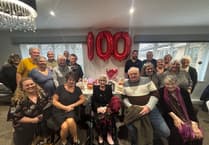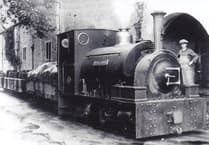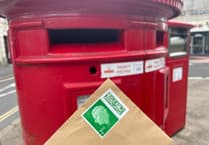Days of prayer throughout WW2
Dear Editor,
As we remember the end of the Second World War, readers may be interested to know that the threat of invasion was so real, King George VI called for seven National Days of Prayer at critical times.
Fear was such that on each National Day of Prayer churches were filled with people pleading for divine intervention.
The first National Day of Prayer took place in May 1940. The British Army was trapped at Dunkirk and so King George VI called for a National Day of Prayer to be held on May 26.
In a national broadcast he urged people to plead for divine help.
People across the British Isles flocked into churches praying for deliverance and this photograph below shows the scene outside Westminster Abbey as people queued for prayer.
Two events immediately followed.
Firstly, a storm arose over the Dunkirk region grounding the Luftwaffe which had been killing thousands on the beaches. And secondly, a calm descended on the Enlgish Channel, such as hadn’t been seen for a generation.
It was only because of this channel calm coming at this precise moment and lasting the length of the evacuation, that tiny boats were able to sail across and rescue 335,000 soldiers.
Because of this sudden channel calm people referred to what happened as “the Miracle of Dunkirk”.
The second and third National Days of Prayer were held during the Battle of Britain. Hitler now sought to destroy the RAF and its airfields prior to invasion. As events became critical, the King called for a Day of Prayer at the height of the battle on August 11 1940.
During the following week Spitfires and Hurricanes managed to destroy 180 Nazi bombers. This brought temporary relief, however on August 30, 800 enemy aircraft filled the skies intending to destroy RAF airfields.
By September 6 the situation was again dire and defeat in the air looked inevitable. The King then called for another National Day of Prayer on September 8. That week 185 enemy aircraft were shot down and Goering gave up his assault.
On September 15, Churchill was able to declare victory in the air.
The fourth National Day of Prayer was called for by the King on March 23 1941 during a period of heavy bombing in London.
He was completely unaware that this was the actual date planned by Hitler for the invasion. German ships were blown off course and Hitler then changed his plans, switching instead to invading Russia.
The fifth National Day of Prayer took place on September 3 1942 when the British Eight Army had been driven back to the borders of Egypt by Rommel’s Afrika Korps.
General Montgomery was appointed as the eighth army commander and led British forces to victory at El Alamein. This battle was the turning point of the war.
The sixth National Day of Prayer was held on September 3 1943, the fourth anniversary of the declaration of war on Germany. Italy surrendered to the Allies within 24 hours and Mussolini was killed.
The Seventh Day of Prayer was in spring 1944 for all military personnel in preparation for the liberation of Europe. This was then followed by an additional call on D-Day itself not only for nationwide prayer, but for a worldwide prayer vigil.
The poor weather that had delayed the D-Day offensive by 24 hours had suddenly lifted on June 6 and allowed the invasion to go ahead with far fewer lives lost than were expected.
Immediately after the Miracle of Dunkirk the Nazi Army stood on the other side of the Channel with over two hundred divisions flushed with victory. Most of our weapons had been abandoned in France so all Britain had was less than one division of armed troops.
No wonder people prayed for Divine help and the King called for National Days of Prayer.
Yours sincerely,
Rev J Williams, BD Dip Theol
Back by popular demand
Dear Editor
I keep being accosted at bus stops and asked why I have not had any letters published in the Journal recently. Apparently they enjoy my letters, but not the Journal these days. The reason is that just as I now cannot read the tiny print on the Letters page, neither can they. They are also fed up with all the letters from national charities and organisations.
I have also not been advertising my regular Saturday councillor’s surgeries at Trinity Methodist Church Hall, Wells Road, Westfield, opposite the Elm Tree Avenue shops. This is because I cannot always make it, but appointments are always possible outside of this. Ring 07979 968416.
I get annoyed when people say that the NHS is broken. In my experience locally, it is not. Staff go above and beyond, with my eye surgeon ringing me on a Saturday afternoon when I was ensconced on my allotment, to say that on reflection he wanted to change my medication!
It is severely stretched, held together by goodwill and volunteers.
Volunteers are absolutely essential to our society so I hope your readers will consider what they could do. At Radstock Museum, at the local British Legion or in South West in Bloom projects, for example.
And thanks so much to all those who have helped me with my shopping, walking up the hill, finding things I have dropped, and so on.
Now if I could just find my cat, Hazel, a Siamese who has wandered off on the old railway line.
Yours sincerely
Eleanor Jackson (Cllr, Lab. Westfield)
Meadow View, Radstock
Message from the Editor: We have seen a noted decline in the number of local letters being submitted in recent times, with national letters having to sadly take their place. We strive to ensure our community has a voice on local matters and would encourage people to get involved and support their local paper by sending letters to [email protected] or by post to MNRJ Letters, 26 High Street, Wellington, Somerset. TA21 8RA





Comments
This article has no comments yet. Be the first to leave a comment.